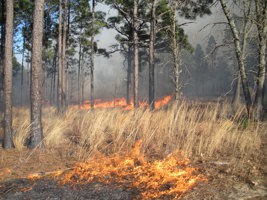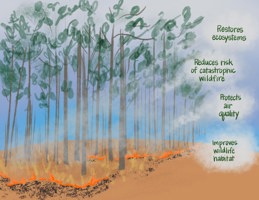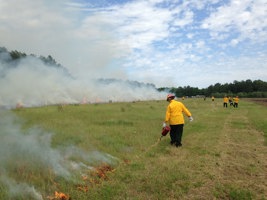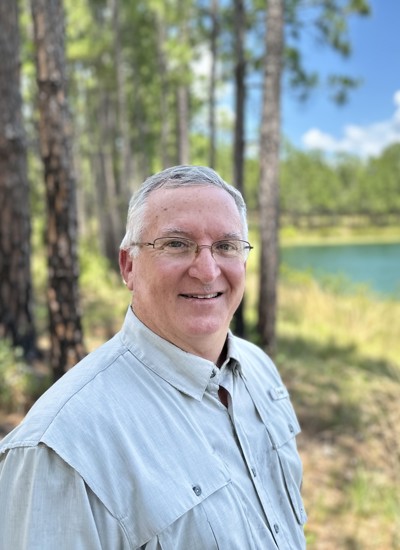- Home >
- Strategic Plan and Focus Areas >
- Southeast Prescribed Fire Initiative
Southeast Prescribed Fire Initiative



About
Fire is a critically important agent of renewal in natural ecosystems which serve as important landscapes for military testing and training. However, wildfires can pose a substantial risk to military installations, including people and infrastructure, and the Southeast has more wildfires than any other region. The Southeast region also includes several fire-dependent ecosystems where prescribed burning is necessary to safely manage the land and resources. Military testing and training in the Southeast is critically linked to prescribed burning, as installations use this management practice for fuels reduction to reduce the severity of wildfires and to manage critical habitat. By promoting prescribed fire as a land management tool, SERPPAS partners minimize the risk of destructive wildfires while restoring critical habitat and species in the Southeast.
Working with fire experts from around the region, the SERPPAS Prescribed Fire Work Group developed a Comprehensive Prescribed Fire Strategy that guides their work. This strategy describes regional, state, and local activities needed to progress toward the strategic goals. The strategy recommends leveraging numerous funding sources, organizations, and networks, and identifies existing tools and models to maximize efficiency and success.
Increasing prescribed fire as a management tool on and off base can enhance military readiness by increasing flexibility under the Endangered Species Act by expanding and sustaining key habitats off-post; reducing fuels to create natural buffers to DoD facilities, infrastructure, and assets; and decreasing liability claims and fire costs from surrounding communities. Managing both private and public land properly with prescribed fire helps restore ecosystems, reduces the risk of catastrophic wildfire, protects air quality, and improves wildlife habitat for game, at-risk, threatened, and endangered species.
Strategic Objectives
- Identify, encourage, and support efforts to quantify and prioritize the use of prescribed fire to achieve desired conditions.
- Identify needs and opportunities to provide funding, capacity, and other support for prescribed burning in SERPPAS priority areas.
- Encourage new and share successful models of burn teams, Prescribed Burn Associations, and other collaborative burn groups.
- Increase burning across boundaries and sharing of personnel and equipment.
- Increase engagement with landowners, communities, and contractors by supporting programs that provide prescribed burning experience, training, and education.
- Encourage and support the development, dissemination, and utilization of new relevant fire science and tools that foster collaboration among scientists and natural resource managers and address the information needs of SERPPAS, regional fire managers, and partners.
- Promote cooperative conservation, protection of public health, and keeping areas in attainment with the National Ambient Air Quality Standards (NAAQS) by encouraging use of basic and enhanced smoke management practices.
- Support efforts that identify and seek to overcome gaps in knowledge, training, and information needs relevant to prescribed burn practitioners, policy makers, and partners.
Work Group Lead

Jennifer Fawcett
Extension Associate, Forestry & Environmental ResourcesNorth Carolina State University
jennifer_fawcett@ncsu.edu
Jennifer Fawcett is an Extension Associate in the Department of Forestry and Environmental Resources, Extension Forestry at North Carolina State University (NCSU). She coordinates the SERPPAS Prescribed Fire Work Group and assists in implementing actions within the SERPPAS “Comprehensive Strategy for Prescribed Fire.” She received her M.S. degree in Forest Resources from Clemson University, and is working towards her Ph.D. in Agricultural Education and Human Sciences at NCSU, with a focus on Prescribed Burn Associations. Jenn currently serves as an Advisory Board member for the Southern Fire Exchange, is a past President for the North Carolina Prescribed Fire Council, and is on the leadership team for the National Extension Wildland Fire Initiative.

Paul Catlett
SE Regional Wildland Fire Coordinator, DoD Fire & Emergency Management ProgramsTexas A&M Natural Resources Institute
paul.catlett@ag.tamu.edu
Paul Catlett graduated from the University of Florida with a bachelor’s degree in forestry. He worked as a forestry consultant for 7 years primarily conducting land management and prescribed fire in central and south Florida. In 1994, Paul became the Natural Resource Manager of Camp Blanding Joint Training Center, the primary training installation for the Florida National Guard in northeast Florida. Over the past 30 years, the red cockaded woodpecker was recovered on the installation and a wildland fire program was built that suppresses 100+ wildfires and conducts 20,000 acres of prescribed fire annually. In October 2023, Paul retired from the State of Florida and took a position with the Texas A&M Natural Resource Institute to support the Department of Defense’s wildland fire transition to the National Wildfire Coordinating Group.
Request to Join Work Group
Resources
Websites
North Carolina State University Extension Forestry
Southeast Prescribed Fire Update - Driptorch Digest
Southern Fire Exchange - Friends of Fire Podcast
Story Maps
The Fourtown Fire - Fire Management on a Landscape Scale
Webinar Recordings
SECAS Third Thursday Forum: Conducting prescribed fire under stronger air quality standards
Recording
PowerPoint Slides
SFE and SERPPAS Virtual Workshop on PM2.5 and Exceptional Events
*PowerPoint slides are accessible in the YouTube description.






